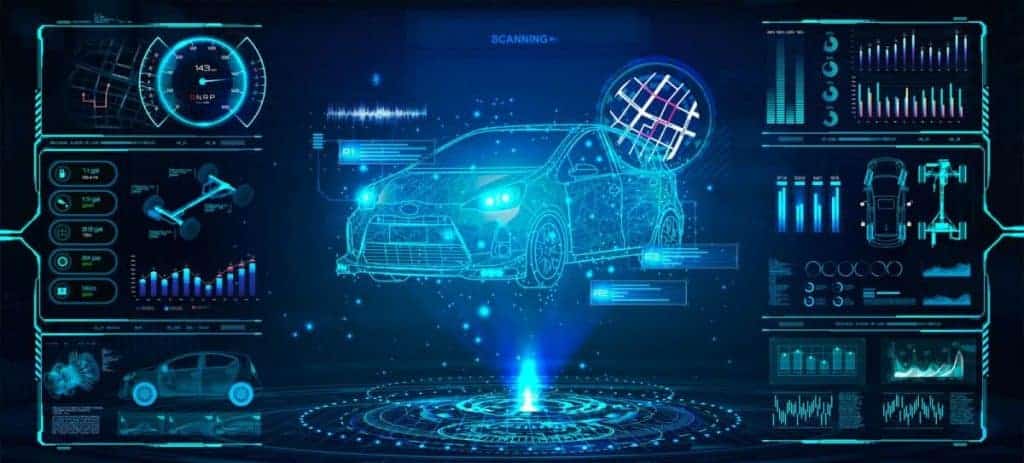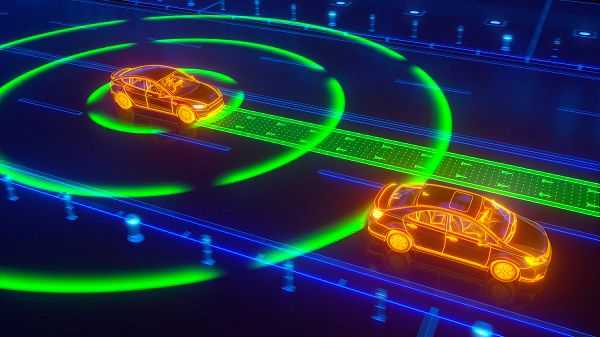Generative AI is Set to Power the Cars of Tomorrow


In Brief
Generative AI has the potential to transform the automotive industry, from manufacturing to automation to passenger comfort and safety.
It can help to pave the way for Software Defined Vehicles (SDVs) and provide greater personalization by anticipating user preferences.
AI and IoT technology can be used to provide predictive maintenance for cars and remote accessories, such as key fobs.
Generative AI will be used to improve fuel efficiency, carbon emissions, and performance of vehicles, but there are still barriers to overcome.
The emergence of generative AI has brought with it great new opportunities across a wide range of industries. This transformative change is set to bring fresh innovations to the world of motoring.
From the manufacturing process, to automation, to passenger comfort and safety, generative AI has the ability to improve the automotive landscape across different areas.

“Tools for generative AI that include extensive language and picture The content development sector now has a universe of possibilities thanks to AI models,” said Sarwant Singh, president and chief commercial officer of MarketsandMarkets. “Among them, automated content generation, improved quality, variety, accuracy, and relevance of content, and enhanced content personalization.
“No area that requires the generation of content, whether marketing, software, design, entertainment, or interpersonal relationships, will be unaffected by generative AI models.,” Singh added.
While we’re already being treated to a taste of the power of generative AI in the form of ChatGPT and other intelligent chatbots, this technology will soon transform the automotive industry for the better.
The Rise of Software-Defined Vehicles
Generative AI can help to pave the way for Software Defined Vehicles (SDVs), which would be powered by vast volumes of coding that could offer a more responsive experience for customers.
Crucially, SDVs will be capable of running updates and upgrades on an over-the-air (OTA) basis, which would work in a similar way to how our smartphones undergo regular software updates overnight on an autonomous basis.

These updates can be actioned entirely through artificial intelligence and can be actioned in response to an anomaly discovered within a vehicle’s framework by an AI program.
The program itself would be capable of operating in a similar way to Amazon CodeWhisperer, which is an AI coding companion that leans heavily on generative AI to improve the productivity of developers through the delivery of code suggestions in real-time based on natural language processing of developers’ comments.
By automatically identifying and updating coding issues, generative AI can help to keep cars functioning and safe from vulnerabilities throughout a vehicle’s lifecycle.
Greater Personalization
We’ll also see generative AI play a key role in delivering greater levels of personalization by actively anticipating user preferences.
This can manifest in a machine learning algorithm that can predict preferred routes, customize online marketplaces, and offer service recommendations based on a given route without the need for any manual input.
For instance, if you’re planning a long journey, your on-board generative AI program could identify your favorite coffee chain en route and highlight it on your sat nav.
This could also automatically work for dashboard preferences, with regularly used features automatically becoming more prominently displayed on navigation panels.
Predictive Car Maintenance
Generative AI will work in tandem with Internet of Things (IoT) technology in the future to deliver predictive maintenance.
Because these AI technologies will be present throughout modern cars, IoT systems will be capable of monitoring the real-time conditions of vehicles by analyzing masses of big data produced by numerous sensors located around the car.

As soon as the data analysis process spots an anomaly or a potential issue with the car, it can automatically alert dealerships to determine whether the vehicle should be taken in for maintenance.
Because the IoT ecosystem caters to every facet of motoring, these predictive maintenance measures can also work for remote accessories like key fobs. For instance, if a key may need reprogramming following an update, the program could put the owner in touch with a local car locksmith service to action the issue before a potential lockout occurs.
Because IoT technology can AI programs to collaborate with other technology-based around a vehicle, we may see artificial intelligence work to improve fuel efficiency, carbon emissions, and improve the performance of vehicles on the fly without having to interfere with the concentration of the driver while on journeys.
The Road Ahead for Generative AI Motoring
Naturally, there are plenty of barriers to contend with ahead before AI-powered vehicles can make the lives of motorists simpler and safer.
One key concern stems from the world of GDPR, and future EU AI Acts which could impact how data is handled by the AI programs offered by manufacturers.
This means that car firms will need to be entirely sure that the data they collect for greater driver personalization and bespoke performance modifications are fully anonymized for security purposes.
The automotive industry has often positioned itself at the forefront of innovation, and we can expect manufacturers to build generative AI into their vehicles over the coming years as a means of providing a greater user experience model for drivers.
For those that embrace this technology faster, we’re likely to see the quicker adoption of AI tools to serve drivers long into the future. With an industry that’s keeping an eye on a fully autonomous future, there’s little doubt that generative AI will form the cornerstone for great strides towards a driverless future.
Read more about AI:
Disclaimer
In line with the Trust Project guidelines, please note that the information provided on this page is not intended to be and should not be interpreted as legal, tax, investment, financial, or any other form of advice. It is important to only invest what you can afford to lose and to seek independent financial advice if you have any doubts. For further information, we suggest referring to the terms and conditions as well as the help and support pages provided by the issuer or advertiser. MetaversePost is committed to accurate, unbiased reporting, but market conditions are subject to change without notice.
About The Author
Damir is the team leader, product manager, and editor at Metaverse Post, covering topics such as AI/ML, AGI, LLMs, Metaverse, and Web3-related fields. His articles attract a massive audience of over a million users every month. He appears to be an expert with 10 years of experience in SEO and digital marketing. Damir has been mentioned in Mashable, Wired, Cointelegraph, The New Yorker, Inside.com, Entrepreneur, BeInCrypto, and other publications. He travels between the UAE, Turkey, Russia, and the CIS as a digital nomad. Damir earned a bachelor's degree in physics, which he believes has given him the critical thinking skills needed to be successful in the ever-changing landscape of the internet.
More articles

Damir is the team leader, product manager, and editor at Metaverse Post, covering topics such as AI/ML, AGI, LLMs, Metaverse, and Web3-related fields. His articles attract a massive audience of over a million users every month. He appears to be an expert with 10 years of experience in SEO and digital marketing. Damir has been mentioned in Mashable, Wired, Cointelegraph, The New Yorker, Inside.com, Entrepreneur, BeInCrypto, and other publications. He travels between the UAE, Turkey, Russia, and the CIS as a digital nomad. Damir earned a bachelor's degree in physics, which he believes has given him the critical thinking skills needed to be successful in the ever-changing landscape of the internet.



















































